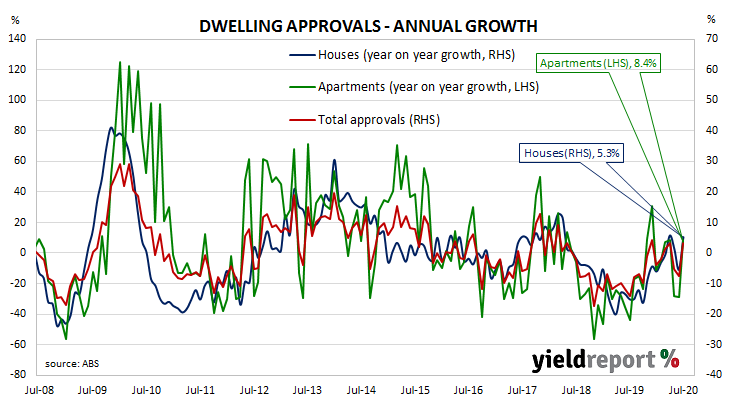Summary: Home approval numbers jump; rise much higher than expected; house and apartment approvals both rise substantially; economists do not expect approvals to keep rising; non-residential approvals resume falling.
Approvals for dwellings, that is apartments and houses, had been heading south since mid-2018. As an indicator of investor confidence, falling approvals had presented a worrying signal, not just for the building sector but for the overall economy. However, approval figures from late-2019 and the early months of 2020 painted a picture of a recovery taking place, even as late as April. Recent months’ figures have been volatile.
The Australian Bureau of Statistics has released the latest figures from July and total residential approvals rose by 12.0% on a seasonally-adjusted basis. The rise over the month was in contrast to 1% decline which had been generally expected and June’s revised 4.2% decline. Total approvals increased by 6.3% on an annual basis, a marked turnaround from June’s comparable figure of -14.8% after it was revised up from -15.8%.
“Dwelling approvals came in well above expectations, surging 12% in July, exceeding our top of the range forecast of a 3% gain. Gains were both stronger and more broadly based than we had expected,” said Westpac senior economist Matthew Hassan.

Commonwealth bond yields slipped a little. By the end of the day, 3-year, 10-year and 20-year Treasury yields had all slipped 1bp to 0.31%, 0.99% and 1.57% respectively.
In the cash futures market, expectations of a change in the actual cash rate, currently at 0.13%, continued to remain low. By the end of the day, contracts implied the cash rate would remain in a range of 0.115% to 0.125% through to the end of 2021.
Economists do not expect approvals to keep rising. “The weak labour market and very low population growth outlook are likely to keep building approvals trending down, particularly in Victoria where the second wave of COVID-19 and related lockdowns are likely to slow the economic recovery. In particular, the impacts of rising unemployment on the rental market will reduce investor demand. Homebuilder is likely to keep house approvals more resilient than unit approvals this year,” said ANZ economist Adelaide Timbrell.

